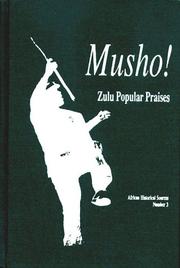| Listing 1 - 6 of 6 |
Sort by
|
Book
ISBN: 1990988741 Year: 2020 Publisher: Oxford : Bhiyoza Publishers,
Abstract | Keywords | Export | Availability | Bookmark
 Loading...
Loading...Choose an application
- Reference Manager
- EndNote
- RefWorks (Direct export to RefWorks)
Book
ISBN: 1776145364 1776140656 Year: 2021 Publisher: Johannesburg : Wits University Press,
Abstract | Keywords | Export | Availability | Bookmark
 Loading...
Loading...Choose an application
- Reference Manager
- EndNote
- RefWorks (Direct export to RefWorks)
Inkondlo kaZulu (Zulu Poems), the first volume of poetry by B. W. Vilakazi, was first published in 1935. This was the first book of poems ever published in isiZulu; it also marked the launch of the newly established Bantu (later, African) Treasury Series, a collection of twenty classic works written between 1935 and 1987 in African indigenous languages. It contains superb nature poems and also reflects Vilakazi's contact with Western modernity. As both a traditional imbongi (bard) and a forward-looking poet who could fuse Western poetic forms with Zulu izibongo (praise poetry), he used his writings to express his resistance to the realities of capitalist exploitation of African labour and the appalling injustices of the migrant labour system. By committing to writing in poetic form what had traditionally been conveyed orally from one generation to the next, he preserves for future generations deep philosophical and emotional experiences of Zulu society.
The republication of Inkondlo kaZulu affords the reader the opportunity to reappraise Vilakazi's intellectual significance and his renown as the 'father of Nguni literature' at a time when the need is acutely felt to unshackle ourselves from ethnic boundaries and break the invisible chains of inherited prejudice.
Zulu poetry --- Zulu language --- Zulu poetry. --- Zulu literature
Book
ISBN: 1776141105 1776140591 Year: 2021 Publisher: Johannesburg : Wits University Press,
Abstract | Keywords | Export | Availability | Bookmark
 Loading...
Loading...Choose an application
- Reference Manager
- EndNote
- RefWorks (Direct export to RefWorks)
Amal'ezulu (Zulu Horizons), first published in 1945, was the second volume of poetry produced by the renowned Zulu author B. W. Vilakazi. It was written during the ten years he spent living in Johannesburg, in 'exile' from his birthplace, KwaZulu-Natal. The poems in this collection represent a turning point in Vilakazi's life; they express yearnings for the beloved land, animals and ancestral spirits of his rural home, as well as expressions of deep disillusionment with the urban life he encountered in the 'City of Gold', and in particular the suffering of the black miners who brought this gold to the surface but never experienced the benefits of the wealth it produced for the mine owners.
Renowned as the father of Nguni literature, Vilakazi was both a traditional imbongi (bard) and a forward-looking poet who could fuse Western poetic forms with Zulu izibongo (praise poetry). In these poems he assumes the role of the voice of the voiceless, and gives poignant expression to the stoic endurance of those caught up in the brutalities of capitalist exploitation of African labour, and the appalling injustices of the migrant labour system.
Zulu poetry --- Zulu literature --- Zulu poetry. --- Zulu language

ISBN: 0841900612 9780841900615 0841900647 9780841900646 Year: 1970 Publisher: New York (N.Y.) : Africana publ.,
Abstract | Keywords | Export | Availability | Bookmark
 Loading...
Loading...Choose an application
- Reference Manager
- EndNote
- RefWorks (Direct export to RefWorks)
English poetry --- Zulu poetry --- Zulu poetry. --- Zulu poetry. --- Translations from Zulu. --- Translations into English.
Book
ISBN: 1990922082 9781990922084 0981406890 Year: 2017 Publisher: Braamfontein Botsotso Publishing
Abstract | Keywords | Export | Availability | Bookmark
 Loading...
Loading...Choose an application
- Reference Manager
- EndNote
- RefWorks (Direct export to RefWorks)
Zulu poetry. --- Zulu literature --- poetry (form) --- South Africa.

ISBN: 1628952016 0870139223 9781628962017 1628962011 9780870139222 0870133063 9780870133060 9780870139222 Year: 1991 Publisher: East Lansing Michigan State University Press
Abstract | Keywords | Export | Availability | Bookmark
 Loading...
Loading...Choose an application
- Reference Manager
- EndNote
- RefWorks (Direct export to RefWorks)
In Musho! Zulu Popular Praises Elizabeth Gunner, an authority on Zulu literature at the School of Oriental and African Studies at the University of London, and Mafika Gwala, a South African teacher and poet, have translated, transcribed, and annotated a wide variety of Zulu izibongo poetry. In so doing, they have revealed the incredible breadth of this traditional genre, which is usually equated with nineteenth-century epic traditions that celebrate the deeds of Shaka and the successor kings of his Zulu monarchy.
Laudatory poetry, Zulu --- Laudatory poetry, Zulu. --- Zulu laudatory poetry --- Zulu poetry
| Listing 1 - 6 of 6 |
Sort by
|

 Search
Search Feedback
Feedback About UniCat
About UniCat  Help
Help News
News